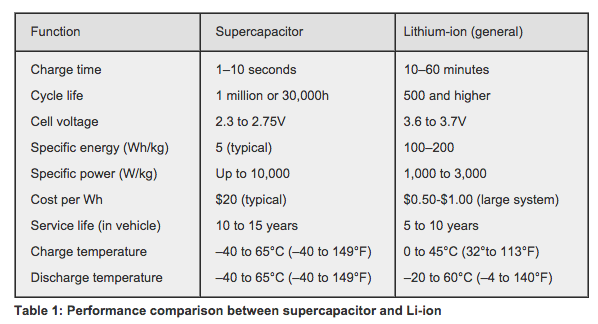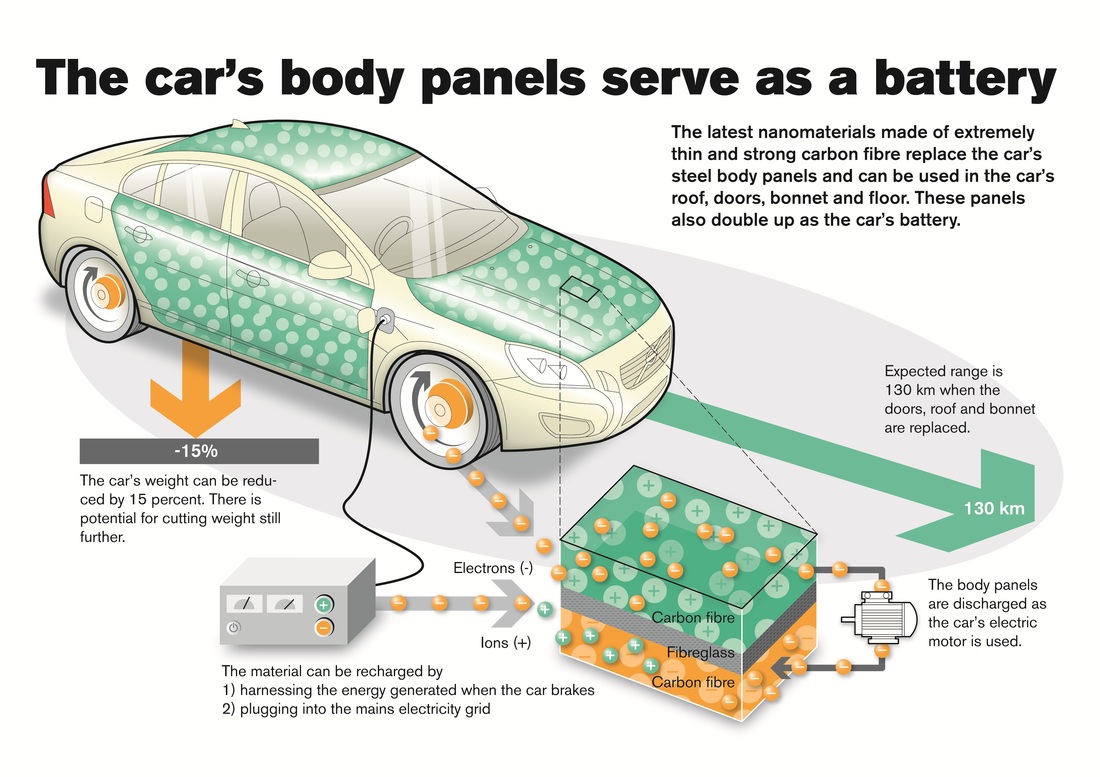Imagine charging your EV in about 5 minutes. Imagine a battery that never degrades. Imagine a not worrying about range.
Super capacitors can make this all happen!
Super capacitors can make this all happen!
We know that capacitors can store electrical energy. Unfortunately, regular capacitors can't discharge that energy slowly, they discharge all of their energy in quick bursts.
Super capacitors are different beasts. Super capacitors can store energy and also discharge energy gradually. They are sort of like batteries. But there are few major differences
"Vehicles need an extra energy spurt for acceleration, and this is where supercapacitors come in," says PhD researcher Marco Notarianni of Queensland University of Technology (QUT) in Australia
"They hold a limited amount of charge, but they are able to deliver it very quickly, making them the perfect complement to mass-storage batteries. Supercapacitors offer a high power output in a short time, meaning a faster acceleration rate of the car and a charging time of just a few minutes, compared to several hours for a standard electric car battery."
QUT is working on new lightweight supercapacitors, which are a thin, strong, high-energy density film made of two all-carbon electrodes sandwiched around an electrolyte. This film is intended to be set in car body panels, roofs, doors, bonnets and floors. The idea, in the short term, is to combine them with Li-ion batteries, where the supercapacitors can store enough energy to charge the battery in minutes.
Super capacitors are different beasts. Super capacitors can store energy and also discharge energy gradually. They are sort of like batteries. But there are few major differences
- Super capacitors can be charged and recharged indefinitely. No issues of battery degradation over time
- They can be charged in matter of minutes, instead of the hours it takes to charge batteries
-
Supercapacitors cannot go into overcharge and does not require full-charge detection; the current simply stops flowing when the capacitor is full. This eliminates the need of an expensive Battery Management System (BMS), used in current generation Lithium-Ion packs.
- Unlike the electrochemical battery, which has a defined cycle life, there is little wear and tear by cycling a supercapacitor. Nor does age affect the device, as it would a battery. Under normal conditions, a supercapacitor fades from the original 100 percent capacity to 80 percent in 10 years.
"Vehicles need an extra energy spurt for acceleration, and this is where supercapacitors come in," says PhD researcher Marco Notarianni of Queensland University of Technology (QUT) in Australia
"They hold a limited amount of charge, but they are able to deliver it very quickly, making them the perfect complement to mass-storage batteries. Supercapacitors offer a high power output in a short time, meaning a faster acceleration rate of the car and a charging time of just a few minutes, compared to several hours for a standard electric car battery."
QUT is working on new lightweight supercapacitors, which are a thin, strong, high-energy density film made of two all-carbon electrodes sandwiched around an electrolyte. This film is intended to be set in car body panels, roofs, doors, bonnets and floors. The idea, in the short term, is to combine them with Li-ion batteries, where the supercapacitors can store enough energy to charge the battery in minutes.
Source : Battery University
Real World Research
After three and a half years of research, Volvo has revealed a first prototype of Volvo S80 fitted with a body part that can store energy. The technology involves using a car's exterior body panels as energy storage systems.
It's still lighter and stronger than the car's regular steel trunk lid and powerful enough to operate the car's start-stop system.
Volvo believes that if used to its maximum potential, it could not only replace an electric car's existing battery components but weigh 15 percent less too.
After three and a half years of research, Volvo has revealed a first prototype of Volvo S80 fitted with a body part that can store energy. The technology involves using a car's exterior body panels as energy storage systems.
It's still lighter and stronger than the car's regular steel trunk lid and powerful enough to operate the car's start-stop system.
Volvo believes that if used to its maximum potential, it could not only replace an electric car's existing battery components but weigh 15 percent less too.
Game Changer
What would this mean for the EV?
With Supercapacitors, an EV can compete with oil based vehicles. You can go upto 500 km per charge.
You no longer worry about battery life because super capacitors do not degrade.
Also a super capacitor powered vehicle would have other advantages. For example, because supercapacitors use carbon and not rare earths like lithium, they’re much cheaper to produce and less toxic.
And humanity can ultimately get rid of Oil and move to clean transportation!
What would this mean for the EV?
With Supercapacitors, an EV can compete with oil based vehicles. You can go upto 500 km per charge.
You no longer worry about battery life because super capacitors do not degrade.
Also a super capacitor powered vehicle would have other advantages. For example, because supercapacitors use carbon and not rare earths like lithium, they’re much cheaper to produce and less toxic.
And humanity can ultimately get rid of Oil and move to clean transportation!
What is the problem?
The big problem is energy density: How much energy can be stored in a kilogram of super capacitors (Wh/kg).
Supercapacitors are around 5 to 6 Wh/kg, while Li-Ion cells store around 200 Wh/kg.
We know that batteries self discharge even if not in use. The self-discharge of a supercapacitor is substantially higher.
The stored energy of a supercapacitor decreases from 100 to 50 percent in 30 to 40 days. Li-ion discharges only five percent per month.
So compared to batteries, supercapacitors have a long way to go. They may get there, but they aren't there yet.
Final Words
We at PluginIndia like to explore and understand the research that is going on with respect to battery technology. The world's best minds are working on the problem of making an electric vehicle go further, 're-fuel' quicker and make it a compelling choice. The next 5 to 10 years are very exciting times as we move away from the use of OIL!
The big problem is energy density: How much energy can be stored in a kilogram of super capacitors (Wh/kg).
Supercapacitors are around 5 to 6 Wh/kg, while Li-Ion cells store around 200 Wh/kg.
We know that batteries self discharge even if not in use. The self-discharge of a supercapacitor is substantially higher.
The stored energy of a supercapacitor decreases from 100 to 50 percent in 30 to 40 days. Li-ion discharges only five percent per month.
So compared to batteries, supercapacitors have a long way to go. They may get there, but they aren't there yet.
Final Words
We at PluginIndia like to explore and understand the research that is going on with respect to battery technology. The world's best minds are working on the problem of making an electric vehicle go further, 're-fuel' quicker and make it a compelling choice. The next 5 to 10 years are very exciting times as we move away from the use of OIL!


